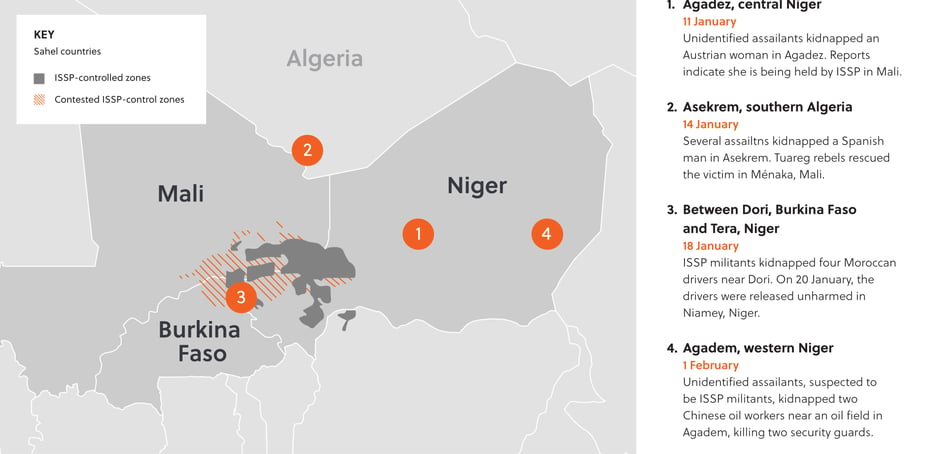In early 2025, Islamic State Sahel Province (ISSP) facilitated their first kidnappings of foreign nationals in nearly seven years. Neo Tsotetsi analyses the incidents and discusses the underlying shifts in the Sahelian security environment enabling it.
In January 2025, Islamic State Sahel Province (ISSP) was linked to the kidnappings of eight foreign nationals in four separate incidents across the Sahel – the first such cases attributed to the group since 2018. The nature of the incidents has sparked concerns among ISSP watchers, with two of the four abductions orchestrated by allied criminal organisations in areas beyond the group’s traditional strongholds in the tri-border area in northern Burkina Faso, eastern Mali, and western Niger. This shift in strategy raises the potential of ISSP consolidating its position and expanding its reach further across the region.
ISSP’s dual-pronged strategy
Islamist militant groups in the Sahel have long used kidnapping as a tactic to expand their sphere of influence and to fund their operations through ransom payments. ISSP’s rival, Jama’at Nusrat al Islam wa al Muslimeen (JNIM), has outsourced abductions to local or transnational criminal networks for years, exchanging hostages and holding them until a ransom is paid, with foreign hostages often eliciting higher ransoms. However, ISSP has made limited use of this tactic, with its last kidnapping of a foreign national occurring in 2018, and its influence mostly confined to the tri-border region.
Until early 2024, the group was embroiled in clashes with foreign forces and JNIM, forcing it to devote resources to protecting its base of operations. While neither France’s counterinsurgency effort Operation Barkhane nor the United Nations Multidimensional Integrated Stabilization Mission in Mali (MINUSMA) dislodged ISSP, their pre-2024 presence in the region limited the group’s scope of operations and diverted attention away from expansion. However, since then, the climate has favoured a resurgence: the French and international security operations have ended; JNIM has largely withdrawn from the region; and the military regimes in Mali, Burkin Faso and Niger are underequipped to effectively counter ISSP and other insurgent groups.
This has allowed ISSP to reinforce its control over the tri-border region, particularly in its long-standing strongholds of Ménaka and Gao in eastern Mali, enhancing its logistical capabilities, especially its ability to hold hostages for extended periods. This capacity is expanded by its alliance with criminal groups, which have established networks to facilitate the trafficking of weapons, illicit substances and kidnapped victims. When combined, these factors augment ISSP’s increasing sophistication and expanding reach, elevating both its intent and capability to conduct kidnappings across the Sahel.
Recent ISSP-linked kidnappings in and near the Sahel
1 January 2025 - 1 February 2025

The threat to foreign nationals in and beyond the Sahel
While it is unclear if the latest ISSP-linked incidents involved any ransom payment, previous cases impacting foreign nationals suggest demands may be as high as USD 10 million.
With criminal groups earnings USD 150,000 to 400,000 per hostage, there is a clear incentive for ISSP and its affiliates to seek out foreign nationals in the region.’’
The tri-border area has long been avoided by foreigners, limiting opportunities for groups like ISSP. However, the three kidnappings conducted outside their typical areas of operation – and the group’s ability to move the hostages to eastern Mali – suggest that places previously considered outside of ISSP's reach, such as northeastern Niger and southern Algeria, are now under threat.
No clear way out
ISSP’s growing transnational ties with criminal groups across the wider Sahel, coupled with the significant counter-terrorism gaps of the military regimes in Burkina Faso, Niger, and Mali, suggest the group’s sophistication and capabilities are growing. Their ability to coordinate and facilitate kidnappings well beyond their traditional areas of control indicates a greater threat to foreign travellers, even if they have no intention of approaching the tri-border area.




